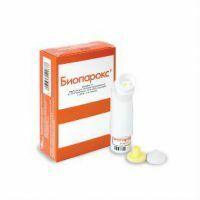
Often catarrhal diseases are accompanied by a runny nose. As a rule, along with the elimination of infection or the virus pass and discharge from the nose. However, if for more than 2 weeks this problem remains, doctors prescribe antibacterial drugs - a spray or drops in the nose with an antibiotic. Such drugs facilitate breathing and eliminate foci of infection.
- Names
-
- Isofras
- Polydex
- Flumucil
- How to use
- Side effects
- For children
- For pregnant and lactating
The absence of timely treatment can provoke the leakage of purulent discharge into the lower respiratory tract and cause the development of bronchitis, or leads to exacerbation of sinusitis. When appointing local remedies for the treatment of bacterial infections, it is necessary to correctly determine the sensitivity of the flora to antibiotics for which a swab of the nose is given.
Names
to the table of contents ^Bioparox
Intranasal spray, convenient for use by dosage form, is used for topical treatment of the nose and throat disorders. The aerosol contains the antibiotic fusafungin. If the drug is ineffective for more than 2 days, it is worth switching to another antibacterial agent. Contraindications - a tendency to asthmatic manifestations.
to the table of contents ^Isophra
The active substance is an antibiotic aminoglycoside - Framicetin. Used in the treatment of bacterial infections of the nasal cavity. This preparation has a polymer base, which makes Isofra safe for use in childhood. It should be noted that this drug has almost no effect in the treatment of diseases caused by anaerobic microorganisms. Analogs of the drug - Garazon, Tsipromed and Sofredeks. The last preparation is made on a water basis, so when it gets on the mucous it has the property of being absorbed into the blood.
to contents ^Polydex
The composition of the drops includes neomycin and polymyxin. These are antibiotics of two different groups that affect different pathogens of infections. Polidexa has a wide spectrum of action and is effective in various types of infectious colds. In addition, these drops in their composition contain xylometazoline, so the use of vasoconstrictive drugs before using Polidex is not necessary.
Thanks to the content of the hormone dexamethasone, the drops have an anti-inflammatory and anti-edematous effect. Phenylephrine, contained in the drug, dilates the vessels. Such a combination of different groups of drugs causes a large number of side effects. Contraindications: adenoiditis.
to the table of contents ^Flumucil
When the nasal congestion is effective, Fluimucil-an antibiotic IT, which contains mucolytic acetylcysteine and a local action antibiotic for the nasal mucosa thiamphenicol. These two substances in the complex have a special stability: acetylcysteine prevents the destruction of the antibiotic and provides a long-term effect of the drug.
Indications for use: diseases of the nasopharynx and upper respiratory tract infectious nature. Pregnant women and children under two years of age are treated with caution. Nursing women do not prescribe this drug.
Read also about how to cure genyantritis with folk remedies http://woman-l.ru/kak-effektivno-vylechit-narodnymi-sredstvami-gajmorit/to the table of contents ^How to use
In order for the active substances contained in the drops, could easily reach the focus of inflammation, before using them, the nose must be cleaned of mucus accumulation. To this end, various solutions are used to wash the nose( Aqua-Maris, Aqualor, No-salt, Humer, etc.).After cleansing, you must drip any remedy containing xylometazoline to remove the swelling of the mucosa.
The course of treatment with antibacterial drops is 5-7 days. The use of such drugs is advisable with a prolonged runny nose, the cause of which is an acute bacterial infection. With the right approach and the right treatment, the use of antibacterial intranasal drugs in many cases eliminates the need for antibiotics in the form of tablets or injections. Treatment of acute sinusitis, sinusitis, etmoiditis, acute otitis includes a complex therapy in the form of local agents and antibiotic intake.
to table of contents ^Side effects of
With local antibiotics, there are not many side effects. Of these, we can distinguish:
- irritation of the nasal mucosa and nasopharynx;
- allergic reactions to the components of the drug.
loading. ..
It is worth dispelling the myth of addiction to drugs of this kind. These drugs do not cause addiction, since they do not affect the nerve endings and tone of the blood vessels. About addiction it is possible to speak only in the event that the composition of the drug includes vasoconstrictor components.
to the table of contents ^For children
The use of drops with antibiotics to treat colds in children is not always safe and should be carefully chosen for the drug and the duration of treatment. Necessary appointments of children's drops in the nose with an antibiotic can only be done by a pediatrician.- Bioparox - from 2.5 years.
- Isophra - from 1 year.
- For children younger than 1 year, Vibrozil and Fluimutsil IT drops are used in minimum doses.
For pregnant and lactating
Of the drugs listed above for pregnant women, you can use with caution Bioparox and Flumucil antibiotic IT.Preparations of Isophra and Polidex during pregnancy are not recommended for use.
During the period of use of the above preparations, breastfeeding of babies should be stopped or other medications approved for use during this period should be selected for treatment.
-
